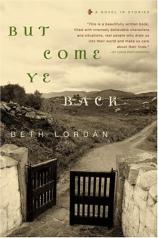Reading Group Guide
Discussion Questions
But Come Ye Back: A Novel in Stories

1. How did you respond to the character of Lyle? Did you feel that he was a good husband to Mary? Was Mary a good wife to Lyle? What was the criteria that you used to answer that question: do you feel that we define the marriages of others by our own desires and expectations for a marital relationship?
2. Do you feel that Mary and Lyle's marriage mirrors that of couples being wed in contemporary times? Is a marriage defined by the generation in which the bond was made, or are all marriages essentially the same across time and space?
3. Of their move to Ireland, Mary observed, "this whole undertaking was courageous ... Lyle was heroic, too, coming away with her to a foreign country where he knew nobody." Discuss Mary's vision of her husband as a hero -- do you believe that sacrificing your own happiness or desires for your significant other is a form of everyday heroism?
4. How is But Come Ye Back the story of the one left behind? Through Mary's death how does Lyle come to find out that he really is the man that she always knew that he was? During three decades of marriage, how did having a "better half" enable him to behave as his "not-better half?"
5. Why do you think that the subtitle is called "A Novel in Stories?" How did the many stories of But Come Ye Back allow readers to look at a relationship in all its facets? Did Lordan succeed in creating a lasting portrait of a couple's maturity and love?
6. How did the second person narration of the last story change your experience as a reader? Why do you think Lordan chose to unfold her final chapter in this voice? Which story in the novel was your favorite and why? Which did you enjoy the least? How would the book be changed if one story were selectively removed from the novel?
7. When the Sullivan sons go to Ireland following Mary's death, the men, who "had never expected to find themselves without her" find that they have little to say to one another. Discuss the prickly and complex nature of communication within families. Do certain family members serve as the catalyst to family members staying in touch; to celebrating family gatherings and holiday celebrations together? Do females -- mothers and daughters -- play a stronger role in keeping families unified? What happens to the Sullivan family when they lose their matriarch?
8. How did Lyle's American heritage and Mary's Irish background form an enduring tension between them? How did they sublimate some of their innate cultural behaviors and mannerisms in order to please one another? In what ways do Lyle and Mary, and Laura and Mark -- like many long-married couples -- loathe each other? In which ways can they not bear to be separated from one another?
9. How does the separation of the narrative into stories reflect the individuality of Mary and Lyle? How does the interwoven nature of these stories represent their connection by marriage and by their children?
10. When Mary longed to return to Ireland she imagined that "she and [her sister] Roisin would go about together: they' talk of their parents and the world as it had been when they were Mary and Roisin Curtin, girls together: they'd share their worries about their grown children. The sea would be near, and butter would have a taste to it, and she' understand the weather; she' get to know her brothers'wives, and her brothers, who had still been boys when she left." How does her homecoming differ from her idealized longing? How does rekindling her relationship with Roisin disappoint Mary's expectations? How does the reality of what she finds in Ireland deflate Mary's vision of her new life?
11. How does the ordinary become extraordinary within the pages of But Come Ye Back? How does Lyle change as a man when he learns to make peace with the intrinsic ordinariness of life? How does this knowledge influence his opinion of what constitutes a "home" and where he sees himself in the world?
12. From reading But Come Ye Back did you feel that you knew intimately the author's own opinions about marriage and long time love? Was Lordan's displayed confidence in longtime love infectious, or did reading But Come Ye Back raise questions for you about the institution of marriage?
But Come Ye Back: A Novel in Stories
- Publication Date: January 1, 2005
- Genres: Fiction
- Paperback: 288 pages
- Publisher: Harper Perennial
- ISBN-10: 0060530375
- ISBN-13: 9780060530372







